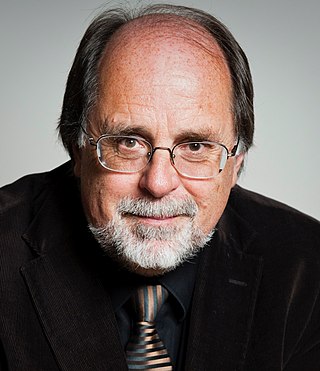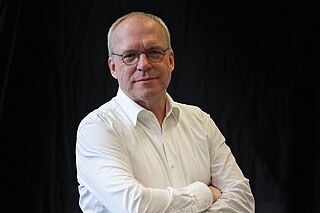Related Research Articles

Christiane (Janni) Nüsslein-Volhard is a German developmental biologist and a 1995 Nobel Prize in Physiology or Medicine laureate. She is the only woman from Germany to have received a Nobel Prize in the sciences.

Peter Schreier was a German tenor in opera, concert and lied, and a conductor. He was regarded as one of the leading lyric tenors of the 20th century.
The German National Academy of Sciences Leopoldina, short Leopoldina, is the national academy of Germany, and is located in Halle (Saale). Founded on January 1, 1652, based on academic models in Italy, it was originally named the Academia Naturae Curiosorum until 1687 when Emperor Leopold I raised it to an academy and named it after himself. It was since known under the German name Deutsche Akademie der Naturforscher Leopoldina until 2007, when it was declared to be Germany's National Academy of Sciences.

The Göttingen Academy of Sciences is the oldest continuously existing institution among the eight scientific academies in Germany, which are united under the umbrella of the Union of German Academies of Sciences and Humanities. It has the task of promoting research under its own auspices and in collaboration with academics in and outside Germany. It has its seat in the university town of Göttingen. Its meeting room is located in the auditorium of the University of Göttingen.

Gottfried Schatz was a Swiss-Austrian biochemist.

Ewald Rudolf Weibel HonFRMS was a Swiss anatomist and physiologist and former director of the Institute of Anatomy at the University of Bern. He was one of the first scientists to describe the endothelial organelles Weibel–Palade bodies, which are named after him and his Romanian-American colleague George Emil Palade. He was known for his work on the anatomy of gas exchange in lungs on multiple spatial scales using stereology.

Tom Abraham Rapoport is a German-American cell biologist who studies protein transport in cells. Currently, he is a professor at Harvard Medical School and a Howard Hughes Medical Institute investigator. Born in Cincinnati, Ohio, he grew up in East Germany. In 1995 he accepted an offer to become a professor at Harvard Medical School. In 1997 he became an investigator of the Howard Hughes Medical Institute. He is a member of the American and German National Academies of Science.

Anthony Arie Hyman is a British scientist and director at the Max Planck Institute of Molecular Cell Biology and Genetics.
The Konrad Zuse Medal for Services to Computer Science is the highest award of the Gesellschaft für Informatik, given every two years to one or sometimes two leading German computer scientists. It is named after German computer pioneer Konrad Zuse. Note that a different medal with the same name is also given out by the Zentralverband des Deutschen Baugewerbes.

Peter Scholze is a German mathematician known for his work in arithmetic geometry. He has been a professor at the University of Bonn since 2012 and director at the Max Planck Institute for Mathematics since 2018. He has been called one of the leading mathematicians in the world. He won the Fields Medal in 2018, which is regarded as the highest professional honor in mathematics.
Emil Heitz was a German-Swiss botanist and geneticist.

Petra Schwille is a German professor and a researcher in the area of biophysics. Since 2011, she has been a director of the Department of Cellular and Molecular Biophysics at the Max Planck Institute for Biochemistry in Martinsried, Germany. She is known for her ground-laying work in the field of fluorescence cross-correlation spectroscopy, and numerous contributions on model membranes. Her current research focuses around bottom-up approaches to building an artificial cell within a broader area of synthetic biology. In 2010, Schwille received the Gottfried Wilhelm Leibniz Prize.
Elena Conti is an Italian biochemist and molecular biologist. She serves as Director and Scientific Member of the Max Planck Institute of Biochemistry in Martinsried, Germany, where she uses structural biology and biophysical techniques to study RNA transport and RNA metabolism. Together with Elisa Izaurralde, she helped characterize proteins important for exporting mRNA out of the nucleus.
The Bach Medal is awarded by the Lord Mayor of Leipzig during the Bachfest Leipzig in recognition of efforts to promote the work of Johann Sebastian Bach. The Bach Medal of the City of Leipzig is an annual award.

Ari Helenius is a Finnish emeritus professor of biochemistry who is known for his research in virology.

Manfred Curbach is a German civil engineer and university professor. He is a leading researcher in the development of textile-reinforced concrete and carbon reinforced concrete respectively.
The Lichtenberg Medal is the highest award of the Göttingen Academy of Sciences and Humanities. It was established in memory of the Göttingen scholar Georg Christoph Lichtenberg. It has been awarded since 2004 to "outstanding scientists who are respected by the public". The winner receives a gold medal and a certificate.
Regine Kahmann is a German microbiologist and was Director at the Max Planck Institute for Terrestrial Microbiology in Marburg from 2000 to 2019. She was made a Foreign Member of the Royal Society (ForMRS) in 2020.
Wolfgang P. Baumeister is a German molecular biologist and biophysicist. His research has been pivotal in the development of Cryoelectron tomography.
References
- 1 2 3 4 "Distinctions of the Academy – Medals – Schleiden Medal". Academy of Sciences Leopoldina . Retrieved 8 May 2015.
- ↑ "Schleiden Medal". Nationale Akademie der Wissenschaften Leopoldina. 6 October 2021. Retrieved 26 November 2021.
- ↑ "Leopoldina ehrt die Zellbiologin Ingrid Grummt mit der Schleiden-Medaille". German Cancer Research Center (in German). Retrieved 26 November 2021.
- ↑ "Cell biologist Anthony Hyman receives Schleiden Medal from the Leopoldina". MPI-CBG. 22 September 2017. Retrieved 26 November 2021.
- ↑ "Leopoldina ehrt den Zellbiologen Anthony Hyman mit der Schleiden-Medaille (07.09.2017)". www.leopoldina.org (in German). Retrieved 26 February 2019.
- ↑ "Dresdner Max-Planck-Direktor erhält Schleiden-Medaille". Dresdner Neueste Nachrichten (in German). 8 September 2017. Retrieved 26 November 2021.
- ↑ "Leopoldina ehrt die Biochemikerin Elena Conti mit der Schleiden-Medaille für ihre Erkenntnisse zur Zellbiologie". leopoldina.org (in German).
- ↑ "Nikolaus Pfanner receives the Schleiden Medal from Leopoldina for insights into mitochondria". Uni Freiburg (in German). 1 September 2021. Retrieved 26 November 2021.
- ↑ "Leopoldina zeichnet exzellente Wissenschaftlerinnen und Wissenschaftler aus". leopoldina.org (in German). 1 September 2021.